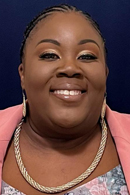
Collaborating with Mental Health Experts to Work with Diverse Youth and Their Families
By Chantrelle D. Varnado-Johnson, Lashika Williams and Jazmine Bowers | May 2024


 As school counselors, we need to work in solidarity with mental health experts. Ultimately, our students will benefit from collaboration with all stakeholders. Fashioning collaborative partnerships inspires our diverse learners to be part of one team, one dream. We have to intentionally broach our culturally and linguistically diverse student body even when this is uncomfortable. Plus, we have to arm our students with academic achievement strategies and resources to elevate critical thinking around postsecondary opportunities (higher education, military, workforce). Exploring data analysis permits us to actively engage our education team, our student community and their families.
As school counselors, we need to work in solidarity with mental health experts. Ultimately, our students will benefit from collaboration with all stakeholders. Fashioning collaborative partnerships inspires our diverse learners to be part of one team, one dream. We have to intentionally broach our culturally and linguistically diverse student body even when this is uncomfortable. Plus, we have to arm our students with academic achievement strategies and resources to elevate critical thinking around postsecondary opportunities (higher education, military, workforce). Exploring data analysis permits us to actively engage our education team, our student community and their families.School counselors must collaborate with our fellow mental health experts in their respective pre-K–12 school settings. Student-focused meetings have to include culturally sustaining documentation and culturally appropriate diagnostic tools, and be inclusive for all constituents. School counselors aspire to learn from the education team while acquiring best practices for developing, managing and evaluating a 21st-century, transformative, comprehensive school counseling program. Moreover, school counselors must be habitually proactive in their comprehensive school counseling programs and uphold ASCA ethical and professional standards.
In 2019, the American School Counseling Association released the ASCA School Counselor Professional Standards & Competencies. These standards describe mindsets and behaviors for school counselors to meet the demands of their profession and needs of pre-K–12 students. Professional development entails state level J.E.D.I. (justice, equity, diversity and inclusion) advocacy models coupled with belonging. That is demonstrating understanding of the impact of cultural, social and environmental influences on student success and opportunities edifying district supervisory positions; and school counselor education positions to meet the needs of exceptional learners. Standard B-9F 8 requires that school counselors “demonstrate advocacy for a school counseling program.”
Foremost, it is important for school counselors to continuously advocate, assess and depict healthy diverse and extensive mental health practices within student academic planning and in community sectors. As mental health experts, school counselors must use advocacy and awareness to meet the goals and demands of students. Mental health is the direct linkage with a student’s physical well-being. Due to large school counseling caseloads and inappropriate duties, student wellness is often overlooked. Therefore, school counselors within their local school district must propel mental health by partnering with all stakeholders to ameliorate stress and by organically crafting DEI advocacy initiatives at the state level to prevent students from falling behind.
Meanwhile, the impacts of systemic discrimination, oppression and institutional racism contribute to disconnection in diverse learners. Frequently, our diverse students need counselors and mental health experts to champion their institutional leaders. Perhaps, local school districts can make a priority of mental health and well-being within the student population, families and communities. The aims of diversifying the family–school collaboration is for all students to thrive, no matter their race, ethnicity, gender or other salient identities. Our students are the key to improved generational outcomes.
Next, it is important for us to network with mental health experts who are competent regarding the community that they are upholding and are active co-conspirators within the community. Within this partnership, identified co-conspirators serve as leaders, advocates and consultants to amplify harmonious voices. Furthermore, school counselors and mental health experts remind students of their academic performance. This entails going into all spaces seeking and open to all perspectives on education. Essentially, collaborative learning entails emphasizing duality in regard to education and competent self-advocacy.
Finally, it is crucial for school counselors to serve as school leaders. Joint collaboration involves awareness of multiculturalism every day. School district collaborators include administration, school counselors, focused groups and community stakeholders. Collaborations are a targeted, universal motive and embody operationalizing culturally responsive S.M.A.R.T. goals (specific, measurable, achievable, realistic, and time-oriented). Above all, school counselors adhere to the ASCA Ethical Standards for School Counselors, ASCA Student Standards: Mindsets & Behaviors for Student Success, and ASCA Professional Standards & Competencies. When developing, implementing and evaluating a comprehensive school counseling program, school counselors should outline culturally responsive interventions when engaging diverse family and youth. This means consulting and collaborating with diverse school personnel. Thus, the ASCA School Counselor Professional Standards & Competencies help school counselors sustain best practices when partaking in collaborative learning initiatives with diverse youth and families.
Dr. Chantrelle D. Varnado-Johnson is LSCA postsecondary vice president and is an assistant professor and school counseling specialization coordinator at Nicholls State University in Thibodaux, Louisiana. Contact her at chantrelle.varnado-johnson@nicholls.edu. Lashika Williams is a second-semester counseling graduate student in the clinical mental health counseling program at Nicholls State University. Jazmine Bowers is a master’s of education candidate in the school counseling program at Nicholls State University.